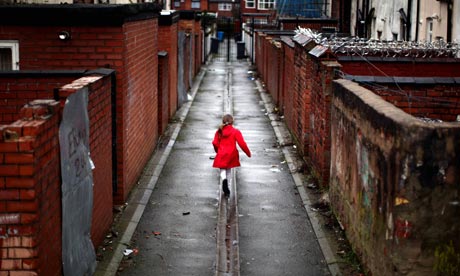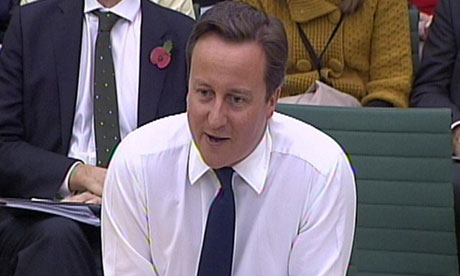Child poverty
- The number of children living in low-income households was 3.9 million in 2008/09 (measuring income after deducting housing costs). The government's short term child poverty target was to reduce the number of children in low-income households by a quarter by 2004/05 compared with 1998/99. This implied a maximum of 3.3 million children living in low-income households by 2004/05. Given that the actual number in 2008/09 was 3.9 million, the government is still 0.6 million above its 2004/05 target.

- Children are more likely to live in low-income households as adults.

- A half of all lone parents are in low income, more than twice the rate for couples with children.

- More than half of all the children in low-income households have someone in their family doing paid work.

- Tax credits now help more than a million children in working families out of low income but the number needing such help has risen sharply.

- Although the number of children who are in workless households is somewhat lower than a decade ago, the UK still has a higher proportion than any other EU country.

Recession puts the north-south divide back on the misery map
• North-east and Wales hardest hit by downturn
• London least stressed despite high unemployment
• London least stressed despite high unemployment

A child playing in Manchester. A charity says 1.6 million UK children live in poverty. Photograph Christopher Furlong/Getty Images
Britain's north-south divide has widened since the start of the recessionand is likely to worsen as households in the north-east and Yorkshire are among the hardest hit by rising unemployment and falling house prices, according to a report.
Stalling wage growth, rising taxes, public sector cuts and personal insolvencies are also piling the pressure on people, say economists at PricewaterhouseCoopers in their regional household financial stress index.
Combining those factors paints a picture of a capital little hurt by the downturn compared with growing misery in Wales, the West Midlands and northern regions.
"Our research also highlights how different London's experience of the recession has been from the rest of the economy. London performs worse than many other regions on measures such as unemployment rates, but our index demonstrates that the impact of the recession on household financial stress has been less in London than in other regions," said John Hawksworth, chief economist at PwC.
The north-east and Wales were found to be the regions that have suffered the greatest increases in household financial stress since the recession began, followed by the West Midlands. A mixture of relatively large increases in unemployment and economic inactivity rates, marked falls in house prices, and significant increases in personal insolvencies all contributed to those rankings, PwC said.
London enjoyed the strongest earnings growth, the steadiest house prices and one of the lowest increases in personal insolvencies.
Looking at prospects for regional economic growth, the south-east and east Midlands are expected to grow the most strongly this year, according to the report, while London is set to pick up as the business and financial services sectors gradually regain momentum.
But the report warned: "The north-east will continue to suffer some of the worst effects of the spending cuts."
The accountants' survey reinforces reports from high street retailers that a gap is once again opening up between London and the south-east and the rest of the country. Fewer shoppers are hitting the streets outside the home counties and those who do are spending less.
Last week Alliance Boots said there was a noticeable north-south gap in recent trade at its Boots the Chemist chain. The retailer said sales had been hit "by the continuing pressures on consumer income, with reduced footfall on high streets, which was more significant outside London and the south-east." Boots pinpointed Wales, Northern Ireland and North Yorkshire as among the weakest trading areas, and said its £1 discount deals were particularly popular in those locations.
The regional misery map is accompanied by PwC's downbeat outlook for economic growth, which it puts at 1% for 2011 and 2012. The forecasters expect no growth in consumer spending next year and that unemployment will rise further as public sector job cuts outweigh private sector job gains.
"Unfortunately there will therefore be no early end to the financial pressures on households across the country, while our regional growth estimates suggest some further widening of the North-South divide next year," said Hawksworth.
"Closing the north-south divide is more difficult than ever for government. Money is tight and the scope for significant transfers to more highly stressed regions is therefore limited."
The signs of a north-south divide straining household echo similar findings on business distress.
Accountancy firm Begbies Traynor reported that amid public spending cuts companies in the north-east, north-west, Yorkshire, the Midlands, the east of England and Wales faced mounting financial pressure, while London and the south-east were getting off relatively lightly.
Unemployed risk losing benefits, says David Cameron
David Cameron announces scheme that will force people in government employment programme to do community work

Prime minister David Cameron said anyone unable to find sustainable employment would be required to do at least 26 weeks community work. Photograph: PA
People unable to find a job after two years in the government's work programme will be forced to do community work or face losing benefits, under a pilot scheme announced by David Cameron on Tuesday.
Cameron said anyone unable to find sustainable employment will be required to undertake at least 26 weeks community work lasting 30 hours a week in order to secure continued receipt of Job Seekers Allowance.
The scheme will be piloted in four areas before it is planned to go nationwide at broadly the same time as the introduction of the universal credit in 2013.
The former Labour work and pensions secretary James Purnell had proposed something similar in 2008, but it did not become law.
Ministers have alighted on 30 hours since they say this will be enough to familiarise the unemployed with the world of work.
Cameron told the liaison committee of MPs; "Have we created a benefit system that has insufficient responsibility at its heart? My answer is 'yes we have' which is why we need to change it".
He complained the average time spent by some people looking for work on JSA is just eight minutes a day. "I don't think that is sufficient," he said.
Employment minister Chris Grayling added: "If people who are fit for employment, still haven't managed to find a job after the intensive support provided by the work programme, we want them to do community work and get into the habit and routine of work. No one should expect to be able to sit at home doing nothing."
He said that under the work programme the government was willing to spend £14,000 per long-term unemployed to find work. The still nascent work programme, largely adminstered by the private sector and voluntary groups, is designed to help the unemployed find work with help on job searches, advice on job applications and sometimes work experience.
The number of jobless likely to be forced into community work to hold onto their benefits is relatively small – the number of people out of work for more than two years is currently in the thousands.
Cameron made the announcement at a wide-ranging session of the liaison committee, broadly themed around the subject of the Big Society and the aftermath of the summer riots.
He also defended plans to increase the amount of benefit that can be withdrawn from a claimant if they break the law and are fined. The government has announced it intends to increase the maximum benefit withdrawal from £5 a week to £25 from 2013, the point at which universal credit is introduced.
He said "otherwise the man in work is forced to pay a fine whilst the person next door who is living on benefits gets off much more lightly".
Critics claim the work programme comes perilously close to a form of compulsory work. From June job centre advisers can instruct claimants to undertake work placement activity. Participants are expected to spend up to 30 hours a week, for four weeks, on their work activity placement and will be required to continue to look for work.
"Every work placement will offer the jobseeker the opportunity to gain fundamental work disciplines and will be of benefit to the local community," the DWP said. Customers who fail to complete a placement without good cause will lose their Jobseeker's Allowance for a minimum of three months.
School uniform costs 'break the bank' for poorer families
Charity warns that rising number of academies and free schools is piling on extra pressure as clothing grants are axed

Pupils from Elizabeth Garrett Anderson School model new school uniform designs at John Lewis. Photograph: Frank Baron for the Guardian
The rising cost of school uniforms risks "breaking the bank" for poorer families as more state schools demand costly branded items and local authorities cut clothing grants, a new report warns.
With millions of children preparing to return to school, a study from charity Family Action, which supports disadvantaged families, says many poorer parents will have paid out 40% of their monthly income in August on "back-to-school costs" alone. It calculates that the bill for equipping a child for the first day of secondary school now averages £191.96 when clothing and equipment are included.
The average cost of uniforms for boys is £160.74 and for girls £155.95. The average for a primary school outfit is £113.44. When other equipment – everything from pencil cases to calculators and dictionaries – is taken into account, the cost climbs further.
Family Action says that uniforms are popular with parents because they "like the overall presentation and smartness" and because they hide "income differentials" as all children are dressed the same. It also suggests that most children like them as "they do not need to worry about having the latest fashions" and therefore do not feel under pressure from their peers. But it says there is clear evidence that the costs to families are rising as schools become more demanding – and as more local authorities withdraw financial support for children moving from primary to secondary school.
The report also warns that the rising number of "academies" and "free schools" could push costs still higher as pupils have to wear distinctive uniforms, available only from specialist shops. This means they are unable to take advantage of cheaper offers in supermarkets.
One fifth of secondary schools are now academies. The first 24 independent state-funded "free schools" open their doors this month.
Family Action found a wide range of support across the country. In the London borough of Hackney, vouchers worth £100 are available to children from households with annual incomes below £16,190 who are transferring from primary to secondary school. But such support is not available in three out of five London authorities. In the north-west of England, only two in five local authorities provide grants.
Helen Dent, chief executive of Family Action, said: "It can't be right that going back to school breaks the bank for some families. Too many families struggle to make ends meet over the expensive summer months in preparation for September. We have some good examples of local councils supporting vulnerable families, but for many families there is no such help and going back to school is squeezing family finances.
"With an increase in the number of academies and free schools in the offing, we want to see firmer guidance from government so that children don't miss out and parents don't dread their children going back to school."
The charity is calling for branded items to be kept to a minimum, and for limits on the number of compulsory items. It is also pressing for more local authorities to offer help. "Devolved budgets for schools should include a ring-fenced amount for school uniform grant schemes for the poorest pupils, so that children are not disadvantaged at school and family finances aren't further squeezed," it said.
Lizzy Clarke, a mother of two from Islington, said: "I received a uniform grant of £150 last year for the transition from primary to secondary school. I tried to buy a couple of sizes up to save money this year and put off buying the new uniform until last week as I wanted to have enough money to make the summer holidays enjoyable."
No comments:
Post a Comment